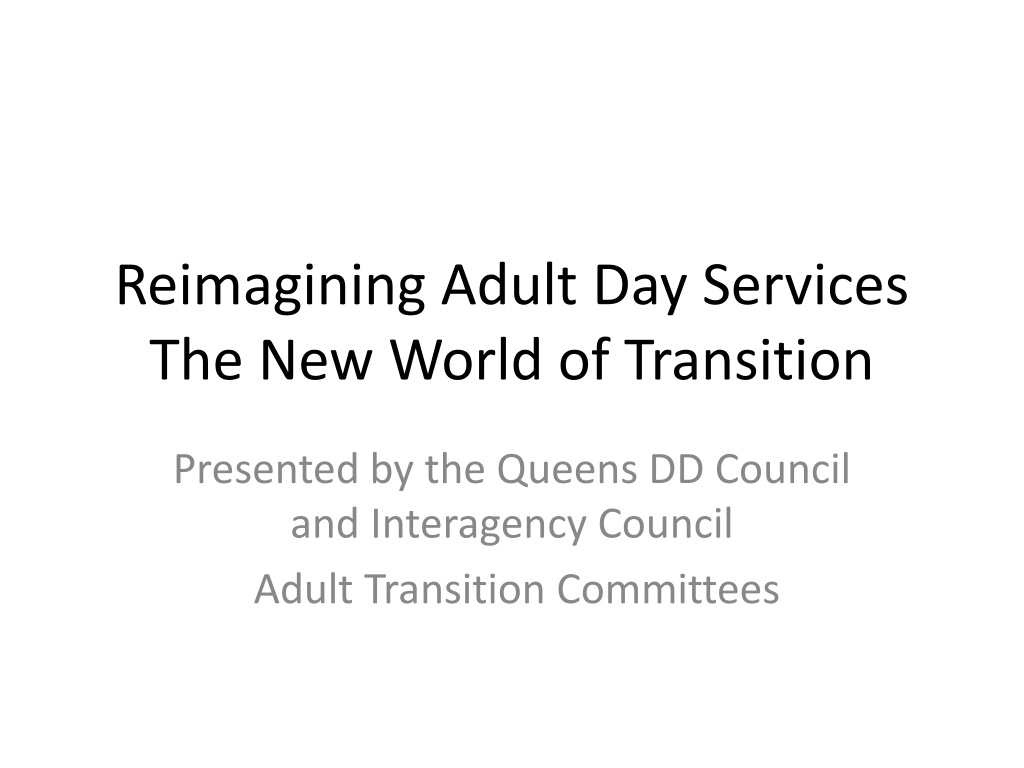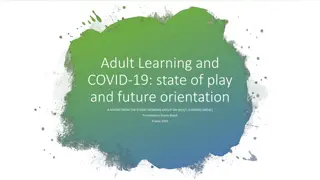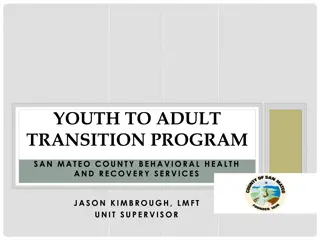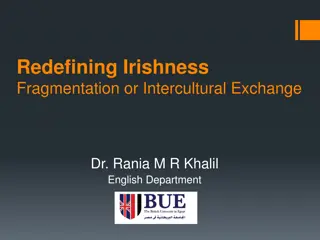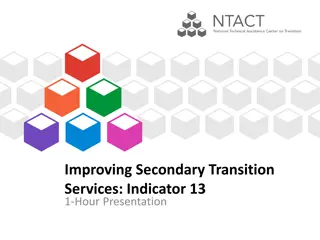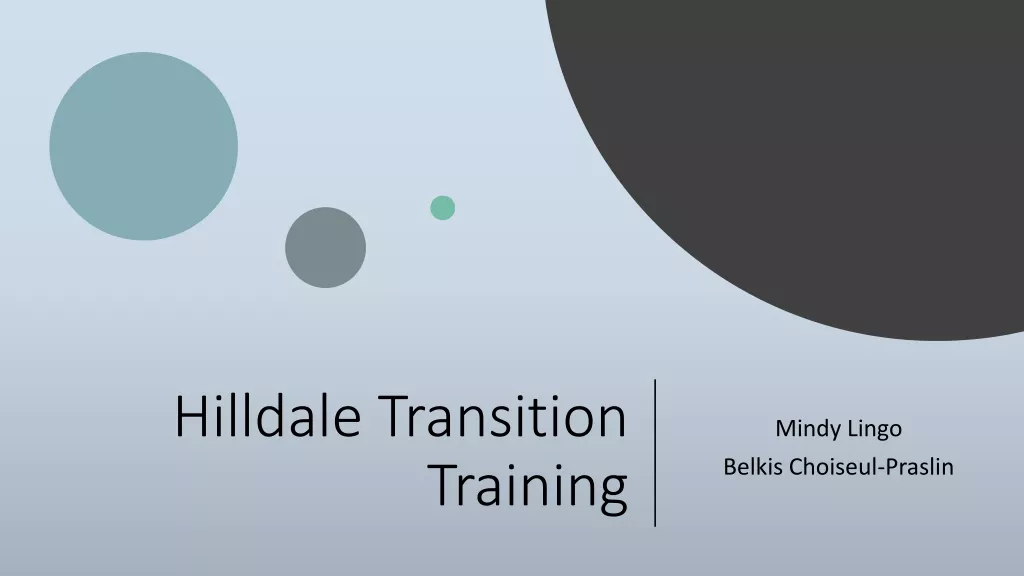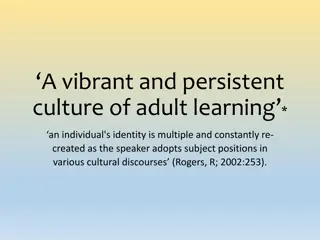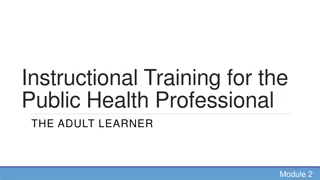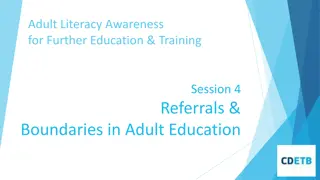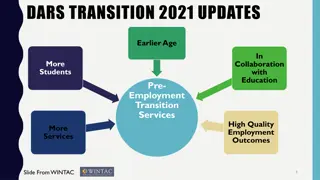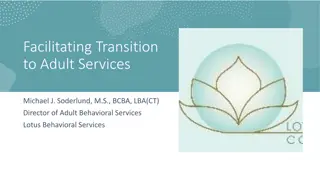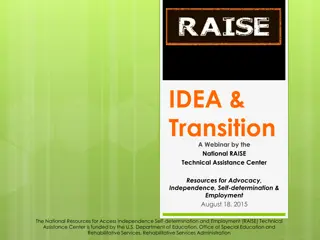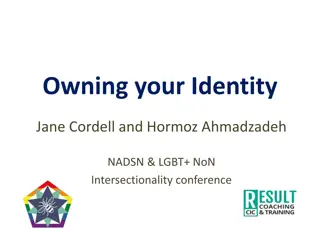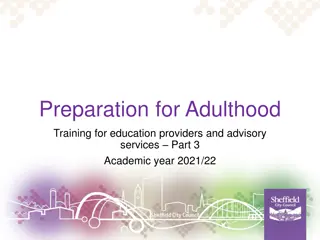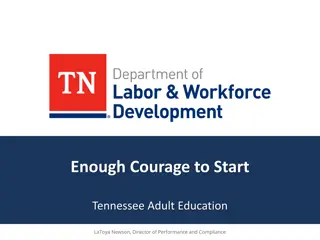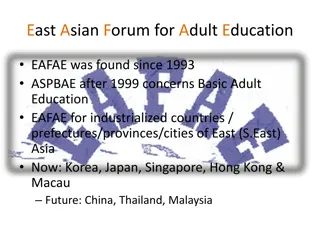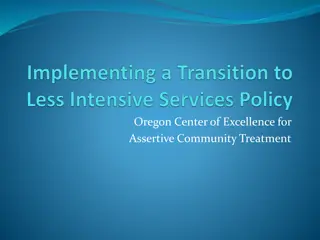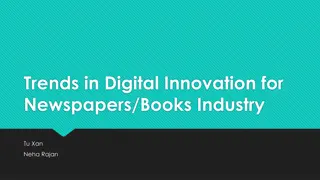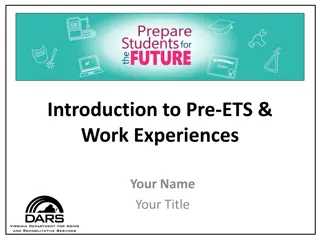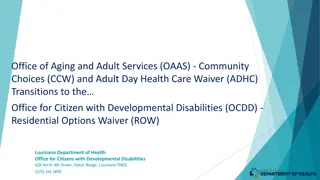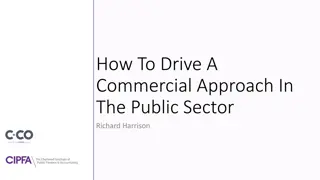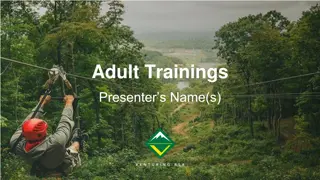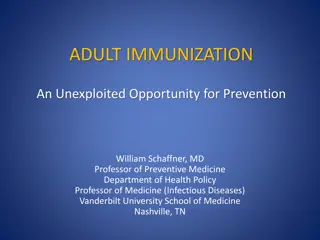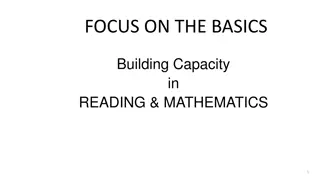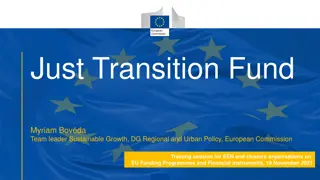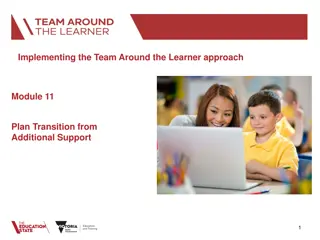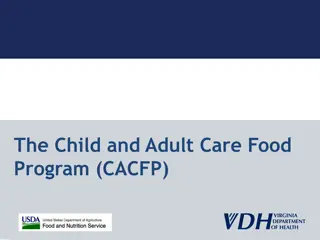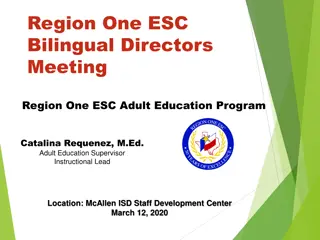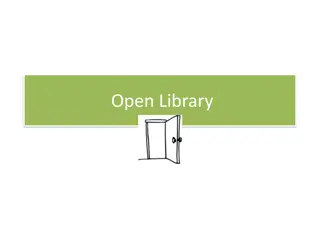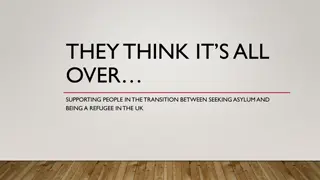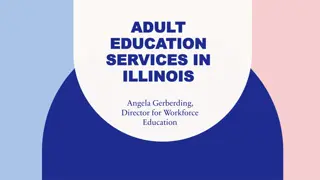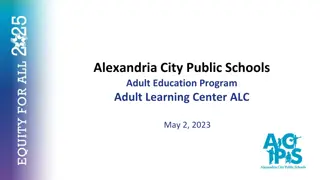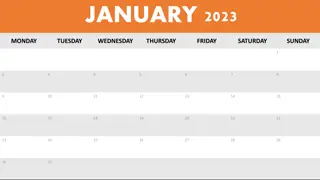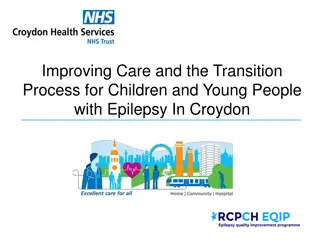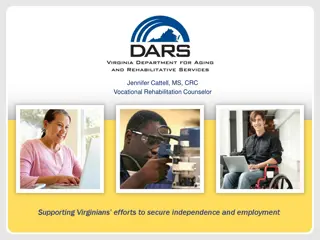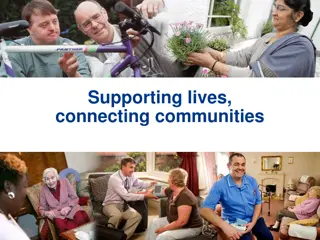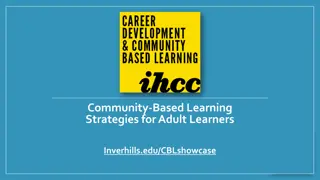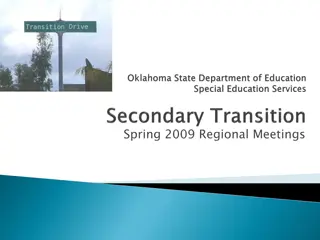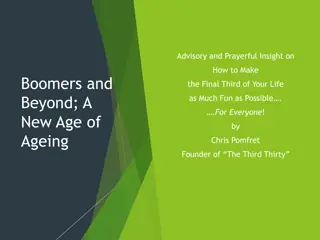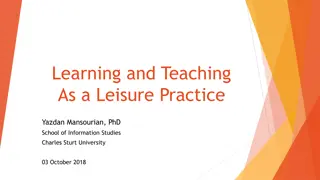Embracing Transition: Redefining Adult Day Services in a Changing World
Redefine adult day services through effective transition planning mandated by Federal law for individuals with disabilities to navigate smoothly from school to adult living. Explore in-person, remote, and blended learning programs to equip young adults with skills for post-school life. Early planning is crucial for accessing support services and opportunities beyond school.
Download Presentation

Please find below an Image/Link to download the presentation.
The content on the website is provided AS IS for your information and personal use only. It may not be sold, licensed, or shared on other websites without obtaining consent from the author. Download presentation by click this link. If you encounter any issues during the download, it is possible that the publisher has removed the file from their server.
E N D
Presentation Transcript
Reimagining Adult Day Services The New World of Transition Presented by the Queens DD Council and Interagency Council Adult Transition Committees
Reimagining Adult Day Services IAC Interagency Council - Reopening Day Services What the future looks like for Day Services - In-person services - Remote/virtual learning - Blended programs In-person and Remote learning
What is Transition? The term transition refers to the planning and services that are needed and mandated by Federal law to prepare youth with disabilities to move smoothly from school to adult living This process includes instruction, community learning experiences, and other support services that will enable these young adults to develop skills, knowledge and abilities to address post-school living, learning or working needs. It may also include assistance in making applications prior to leaving school for services from community agencies such as those assisting with Day Habilitation Programs and Supported Employment programs.
What is Transition? (cont) The transition process is a set of coordinated activities that are designed to help students move smoothly from school to adult life. This process formally begins during the year that the student turns 15. Most schools have a Transition Team Leader or a guidance counselor to assist in the transition process. Transition planning is a part of the Individualized Education Program (IEP), and will be reviewed each year.
What is Transition? (cont) The Transition Process focuses on the student s dreams and aspirations by using Person Centered Planning techniques. The student should always be invited to annual meetings. All interested parties and agency representatives should be invited to take part in these planning sessions with the consent of the family.
Early Planning is Essential Because: 1. There is NO GUARANTEE of a job, adult day program, vocational training or other community services once the student leaves school. 2. It provides more time to explore options and alternatives with representatives from schools and outside agencies. 3. It will assist in receiving appropriate services upon transitioning from the NYC Department of Education, as well as services while they are still in school.
Early Planning is Essential Because: 4. It will identify skills to be developed that will lead to greater independence and/or participation in the community for the person. 5. Participation of all parties at the planning meetings helps to focus on the person s needs. 6. It relieves anxiety for the entire family when planning is formulated.
Transition Services Include Instructional Activities Community Integration Collaboration with Adult Services Agencies Post High School Options Independent Living Skills
Other Types of Transition: School Age to College Day Habilitation to DH without walls / Community Pre-Vocational / Employment Training Program (ETP) / Supported Employment / Pathway to Employment /Community Habilitation / Self-Direction Day Habilitation program to Senior Program Program to Program - Different Agencies Family residence to own apartment or group residence
What is OPWDD? New York State Office for People with Developmental Disabilities
OPWDD This agency provides funding and oversees all programs that are designed for individuals with a developmental disability. Most OPWDD programs are funded through Medicaid. The Commissioner of OPWDD interacts with the Governor of NY State to get a share of the state s allocated Medicaid budget. The Medicaid money is allocated to the localities and each county has a DDRO. The Queens Developmental Disabilities Regional Office is located in Queens Village.
What Adult Services Are Available? Day Habilitation Services Blended (In person/remote learning) Day Habilitation Without Walls Community Pre-Vocational Services Blended (In person/remote learning) Pathway to Employment Employment Training Program - ETP Supported Employment Innovative Programs - Self - Directed Services - Community Habilitation - Respite/Recreation/Environmental Modification - Family Reimbursement/Summer Camp/After School
Day Habilitation Services Provides a range of supervised experiences in community settings. Services are designed to meet each person s choices and needs. Individuals learn functional life skills (money, food preparation) and computer technology. Work on socialization skills. Participation in various volunteer sites in the local communities is a goal. Learn self advocacy in the community. Develop travel and community safety skills. Prepare for the possibility of employment if it matches the individual s skills and interests.
Community Pre-Vocational Services Prepares individuals for employment or independent volunteer opportunities. Services include the teaching of skills for employment such as attending to task, task completion, problem solving and safety. Individuals work on services that meet their own goals.
Supported Employment Programs are designed to enable adults who have a developmental disability to secure and maintain gainful employment in the community with the support of a job coach. Services include vocational testing and assessment. Individuals must be travel trained and are then route trained to their individual work sites. Services bridge the gap from school to actively functioning in the world of competitive employment.
Innovative Services Day Hab Without Walls - a service that emphasizes an individual s access to the community according to his/her goals. Employment Training Program - this program is an employment initiative through OPWDD. Self-Directed Service - every individual who has a disability has the right to make a choice. This program revolves around this concept and is entirely person centered. A circle of support is chosen by the person and family to meet individual needs. Pathway to Employment is a person-centered, comprehensive employment planning and support service that engages individuals in identifying a career direction, provides instruction and training in pre- employment skills and develops a plan for achieving competitive, integrated employment at or above minimum wage.
Steps to take with OPWDD Schedule Psychological, Psychosocial and Medical Evaluations Must have Medicaid Apply for OPWDD eligibility Attend a Front Door Information Session scheduled virtually on a monthly basis in English and Spanish Contact Front Door Intake Line 718-217-6485 once Eligibility has been determined Apply for Care Management (CM) through a Care Coordination Organization (CCO) or NON-Medicaid Case Management Agency. Research OPWDD services and programs with the school Transition Team. Research Adult Day Service Programs before the child s last year with the Department of Education. Ask if the agency will schedule in-person visits.
Steps to Obtain Adult Services Maintain contact with Care Manager. Decide on the Adult Day Service that the student and family is interested in receiving. Submit all pertinent paperwork to the agency. The family, CM and school should work together. Notify the school Transition Staff when a service is selected.
Steps to Obtain Adult Services (con t) The placement process must be a collaboration between the student, family, the school, the new service and the Care Manager Everyone is an integral part of ensuring that appropriate services are in place for all students transitioning from the Department of Education.
The Role of the Care Manager in Transition There are many documents that are going to be needed by the Adult Day Program, and it is the responsibility of the CM to ensure that all necessary paperwork is submitted in a timely manner to ensure placement into a program. The Care Manager should always be in contact with the families and Transition staff during the transition period.
Documents needed for Adult Day Services Active Medicaid Card Social Security Card Birth Certificate/Passport or Permanent Resident Card CURRENT Medical Exam form (within a year and should include current medication/dosages/times) Quantiferon Gold Blood Test for Tuberculosis (TB), Two negative TB/PPD tests or negative chest X-Ray with Dr. s note stating no signs or symptoms of TB. Psychological Evaluation (within 3 years) Psychosocial Evaluation ( within 1 year) Level of Care Eligibility Determination (LOC) Service Authorization or Services Amendment Forms /Notice of Decision/LIFE PLAN/Addendum Waiver Packet DDP 2-computerized print out Agency Intake forms to be completed ACCES-VR Application Form (for vocational services)
Other Documents that may be needed: Additional Medical Documentation IEP from the school Psychiatric reports Signed Consent for Placement Other School Reports NYS Identification/Non-driver s ID/Passport
Applying for Benefits Explore eligibility for SSI as at age 18 or earlier depending on family income Must be MEDICAID enrolled with appropriate code to fund OPWDD services Need to make sure the following are brought when applying for Medicaid and SSI: Birth Certificate Proof of family income Photo Identification Letter that the child attends school Medical form with diagnosis Psychological Evaluation Psychosocial Evaluation
Technology and Transition There are numerous websites to assist with planning for the future. Here are just a few: - Social Security Administration- Information on applying for Social Security Benefits: www.ssa.gov 1 800-772-1213 - Human Resources Administration (HRA) Information on applying for Medicaid Benefits: www.nystateofhealth.ny.gov 1 888-692-6116 Fax#: 1 917-639-0732 - ACCES-VR-Adult Career and Continuing Education Services- this is an agency that can assist with finding employment: www.access.nysed.gov - Queens Council on Developmental Disabilities (QCDD)- this is the OPWDD council for the borough of Queens. Many resources are listed on this site: www.qcddny.org - New York State Office for People with Developmental Disabilities (OPWDD): Information and Forms: www.opwdd.ny.gov - District 75 has a website that will let you stay up to date on all activities throughout District 75: http://schools.nycenet.edu/d75/
Region 4 Front Door Webinars The sessions last approximately 1 hours. Please register no later than 3 days before the webinar. You must register with your borough. Queens 718 217-6485 Tawanna.X.Haynes@opwdd.ny.gov or Vivia.Cousins@opwdd.ny.gov Manhattan 646 766-3220 Joanna.Johnson@opwdd.ny.gov or Kathleen.Kingston@opwdd.ny.gov Brooklyn 718 642-8576 Marilyn.Smith@opwdd.ny.gov Bronx 718 430-0757 Myron.Woodley@opwdd.ny.gov Staten Island 718 982-1913 Eileen.Maturi@opwdd.ny.gov The following information is necessary in order to register: Name, DOB and home address of applicant Name, phone number, email of the participant and their relationship to the applicant November 5th English 10am 12th Spanish 10am 19th English 10am December 3rd English 10am 10th Spanish 10am 17th English 10am
